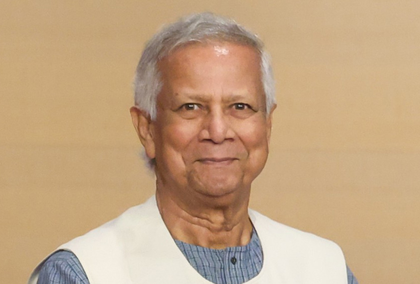Revelatory decades-old documents: Did Muhammad Yunus hijack famed microcredit model?
By IANS | Updated: November 26, 2025 18:35 IST2025-11-26T18:32:35+5:302025-11-26T18:35:14+5:30
New Delhi, Nov 26 Muhammad Yunus, widely recognised as the founder of Bangladesh’s conglomerate Grameen Bank is set ...

Revelatory decades-old documents: Did Muhammad Yunus hijack famed microcredit model?
New Delhi, Nov 26 Muhammad Yunus, widely recognised as the founder of Bangladesh’s conglomerate Grameen Bank is set to come under the cloud, over ‘revelations’ of decades-old documents by a former intelligence officer, which claims that the microcredit model was actually a university research program and it was subsequently hijacked by the Nobel Laureate and “projected as his own”.
Ex-Bangladeshi intel officer Aminul Hoque Polash claims to have unearthed a series of archival documents from 1976-1983 that fundamentally challenge Muhammad Yunus’s credentials of being the founder of the Grameen Bank, the institution that was instrumental in winning him the Nobel Peace Prize in 2006.
Aminul Hoque Polash served ten years in the National Security Intelligence (NSI) and later as a diplomat, and is currently living in exile. He claims that he was forced to leave the country because of was singled out and targeted for persecution by the Yunus regime.
The documents, he claims, show that the microcredit model was actually a university research project created by junior researchers, and Yunus later hijacked it, and the papers also have his signature.
Notably, the model of Grameen Bank, under which small loans (micro-credit) are disbursed to impoverished families without any collateral, became so popular that it was replicated the world over, including some cities in the US and Europe.
The documents accessed by IANS show that the microcredit project originated at Chittagong University, where Muhammad Yunus served as a professor.
“The Rural Economics Programme (REP) was launched in 1976 with a Ford Foundation grant, and the first micro-lending experiment in Jobra village was an action-research project run by research scholars named Shapan Adnan, Nasiruddin and H.I. Latifee. Yunus was only assigned the task of deep tubewell cooperative management,” it said.
It further claims that the Bangladesh Bank adopted the microfinance model and planned a nationwide rollout before Yunus joined.
Another letter dated June 6, 1983, shows the Ford Foundation writing to Chittagong University Vice-Chancellor, approving grants to the varsity for supporting its rural finance program.
The microcredit model, which initially started as a University program in 1976, eventually turned into a national scheme after being authorised by government ordinance to work as an independent bank.
Yunus became its Project Director and, after the 1983 Grameen Bank Ordinance, assumed the role of Managing Director.
The former intelligence officer, unrelenting in his attack on the Yunus regime, also goes on to claim that Bangladesh is witnessing a redux of what it saw during the 1970s.
Polash claims that the man who hijacked the famed microfinance model is now trying to usurp the state machinery, after taking over power illegally in 2024, and using it to erase obstacles, reward loyalists, and enrich his network.
“The same man who stole a rural research project now governs an entire country with the same appetite for capture,” he says with an alarming tone.
Citing multiple incidents of impropriety and misconduct, he claimed that prison sentences of criminals are being overturned, corruption cases are being withdrawn, and undue financial benefits are being extended to Grameen companies.
He also holds the Yunus regime accountable for aggressive nepotism in governance, disbursal of licences to his enterprises, tax exemption and other favours being extended to Grameen Bank.
“The same man who stole a rural research project now governs an entire country with the same appetite for capture,” he says in an alarming tone.
Disclaimer: This post has been auto-published from an agency feed without any modifications to the text and has not been reviewed by an editor
Open in app